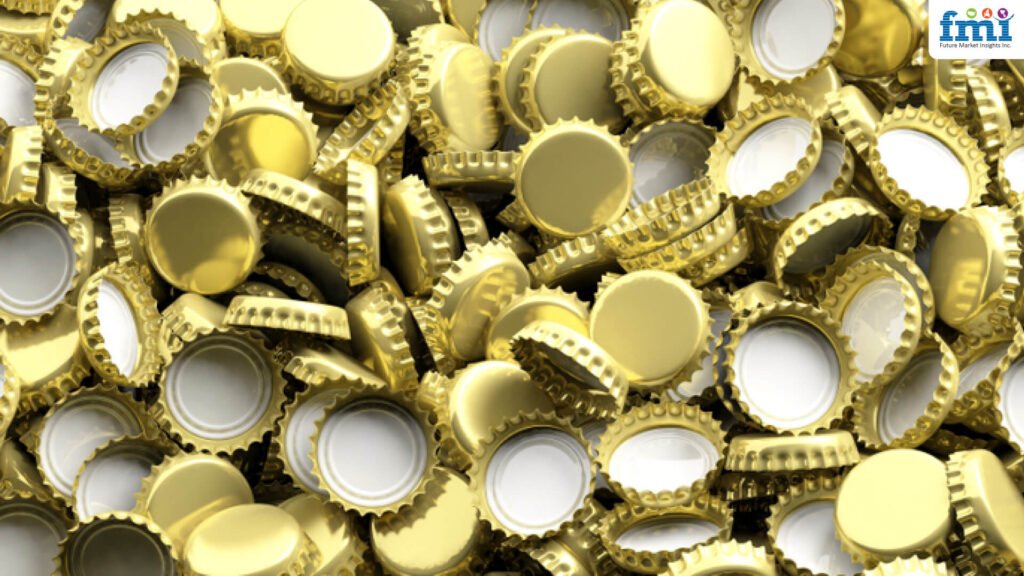
The packaging industry is vouching for a boom in innovation and environmentally friendly alternatives, with closures determining product preservation and consumer ease.
Among the many closure choices in the market, crown closures are widely adopted and a proficient solution, especially in the beer and soft drink area.
But before diving into the sea of crown closure trends. Let’s see what the experts say about the numbers of the market:
Ismail Sutaria, the Principal Consultant for the Packaging Sector at Future Market Insights (FMI), comments, “The crown closures market is slated to embark on a slow but consistent growth trajectory, exhibiting a CAGR of 2.5% through 2033. The sales revenue of the crown closures infers a valuation of US$ 1,389.47 million by 2033”
Now, we will explore the dynamics of the crown closures sector, probing diverse trends, troubles, and opportunities of these two beverage sectors.

Brewing Perspectives: Insights into the Pulse of the Beer Segment
The crown closures industry has a profound impact on the global beer market, ushered by the appeal of this cherished beverage around the distinctive population and cultures. The competitive landscape of the market is dynamic. The ascend of craft breweries is a trend that has deranged conventional market dynamics and is now devising the fate of the crown closures market. This folklore of trials and innovation, strengthened by microbreweries, is a testimonial to their profound influence on the industry.
Craft breweries with a unique preference for crown closures have seen a growth spurt, recently. These closures, with their quintessential aesthetic charm, affinity with different bottle types, and preservation ability of the artisanal individuality of their beverages, harmonize ideally with the brand image of home-crafted brewers. This choice is not just limited to aesthetics but regarding the quality that crown closures embody, alluring to the thoughtful consumers looking for these values.
- The prime closure producer BERICAP got the TOP100 approval seal as one of the ingenious small and medium enterprises in Germany.
The craft beer resurgence has ushered growth avenues for an elevated interest in carbon neutrality in the beer packaging industry. Consumers prioritize sustainable products, and breweries seek greener packaging solutions, like renewable and reusable crown caps. This transition into sustainability coincides with consumer requirements and devises a prospect for crown closure producers to innovate economically greener choices.
Customized packaging designs, like embossed crown closures, have reformed beer branding and promotional campaigns. Craft wineries use these personalized caps to uplift brand visibility and strengthen consumer connections in a competitive market.
- A United States-based packaging firm called AptarGroup has signed a collaboration agreement with Nippon Closures. It marks a cross-license registered intellectual property exchange between AptarGroup and Nippon Closures.
Pop the Potential of the Trends in the Soft Drink Industry
The crown closures are pivotal in securing carbonation, flavor, and freshness, promising a pleasant drinking experience for soft drink consumers. Despite the presence of alternative packaging solutions for instance, PET bottles and cans, glass bottles with crown closures gain unwavering traction.
The escalating demand for organic and healthier items is an essential trend molding the soft drink segment. Consumers are increasingly inclined toward drinks and beverages that are preservative-free and not filled with artificial additives.
- Beer sector accounts for more than 70% of global crown closures demand, followed by the soft drink beverages.
One of the prominent trends shaping the soft drink market is the growing demand for healthier and natural products. As consumers gravitate towards beverages free from artificial additives and preservatives, manufacturers are responding by offering a diverse array of natural and organic options. Crown closures serve this trend by offering a reliable seal that secures the authenticity of the product, and aligns with the demand of the customers for clean-label beverages.
The boom of functional beverages, like energy drinks, ready-to-drink teas, etc propounds new prospects for crown cap producers. The novel category of innovative drinks needs packaging that can combat distribution troubles while retaining the true essence of the product. Crown closures emerge as the trailblazers with their solid sealing characteristics and different designs, to fulfill the needs, making them an integral choice for soft drink packaging by the manufacturers.
Intricacies in the Crown Closure Industry
With plenty of opportunities, there is a critical challenge for the market too, i.e. the presence of various options for closures contending for the market share. Crown closures cater to numerous benefits but the producers constantly are innovating to stay abreast with the progressing consumer alternatives.
The next major roadblock in the growth path is sustainability and renewability. Though these are intrinsically recyclable, attempts to enhance the recycling rates and diminish the ecological impact continue. The producers are constantly seeking alternative materials and production techniques to augment the biodegradability of crown closures, warranting they coincide with bio-based economy standards and statutory requirements.
Crown Closures as Insignia of Product Integrity
Consumers are actively looking for convenience and on-the-go consumption products, which presents an opportunity for crown closures to cater to the changing consumer requirements. Crown closures or caps that come with resealable designs, easy-open tabs, and tamper-proof seals fulfill the consumer’s demand for convenience and give a positive brand experience.
The COVID-19 pandemic had brought forth myriad challenges and opportunities for the crown closures market. The industry faced obstruction in the distribution network and production technology because of the lockdowns and restrictions, the amplified demand for packaged beverages, such as beer and soft drinks, served as a silver lining.
- In March 2020, Pelliconi of Ozzano was a vital crown cork supplier in China. The company was persistent in running despite the COVID-19 pandemic, which resulted in the shutdown of multiple factories. The early February opening served as a benefit, with reference to shipping agility and market proximity.
Consumers transitioned into at-home consumption, and vendors saw a soar in demand for packaged drinks, sustaining the demand for functional closure systems. The pandemic highlighted the prominence of hygiene in packaging, escalating awareness and probing for tamper-evident attributes. During such times crown closures, with their intrinsic anti-tamper properties, are accentuated as dependable alternatives for product reliability and buyer confidence.
Final Thoughts
The crown closures market for beer and soft drinks exhibits a fusion of innovation, culture, and consumer-driven choices. To experience growth in the beverage sector evolution, the crown closure manufacturers must be relevant to the shifting dynamics, and capitalize on personalization, on-the-go convenience, and sustainability.
After comprehending the requirements of soft drink and beer makers and consumers, the crown closure manufacturers can set up as allies to carve out the packaging innovation future.
